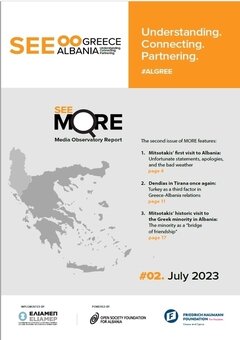Regional Cooperation
2nd MORE Report: Chapter III. Mitsotakis’ historic visit to the Greek minority in Albania

Short Background
Just a few days after his visit to Tirana, Kyriakos Mitsotakis visited Himare, Livadhja and Dervican, where many ethnic Greeks live, on December 22. The visit was originally scheduled to take place on December 7, but had to be postponed due to bad weather. It was the first visit by a Greek premier to Albania’s ethnic Greek minority areas since his late father, Konstantinos Mitsotakis, traveled there as PM 31 years ago. In Himare, Mitsotakis was accompanied by Olympic gold medalist Pyrros Dimas, a native of the town, while in Dervican he was joined by Edi Rama. Both PMs declared the Greek minority to be “an irreplaceable bridge in the inextricable connection between our two countries.” Rama announced that he would renovate the square in Dervican and rename it after Mitsotakis’ father, a gesture that was highlighted in the media.
The purpose of the Greek PM’s visit was twofold: to speak with representatives of the Greek minority, to listen to their problems and declare Greece’s support, as well as to send the message that Albania’s European perspective will only be possible as long as Tirana respects the rights of Albania’s ethnic Greek minority.
Media Coverage
It has been 31 years since a Greek prime minister visited the ethnic Greek minority areas in Albania, and that attracted the attention of media in both countries. The coverage was adequate for the event and lasted for some days on the national news. The event was captured as symbolic and historic by the Greek media, emphasizing the importance of the Greek minority for the bilateral relations between Greece and Albania, and highlighting that this is a neglected topic. Despite the general image, there were also media in which they repeated many standard nationalist, anti-Albanian, and irredentist tropes.
Albanian Media was equally interested in covering the topic of the visit. Stories emphasized his two distinct messages: respect for the rights of the Greek minority and support for Albania's EU accession. It did not, however, go unnoticed by some Albanian media that ethnic Greeks turned up to listen to the Greek PM carrying Greek flags, while others chanted nationalist slogans.

Key Findings
- The Greek PM made two symbolically important visits to Albania in the space of two weeks. The main message was that Greece and Albania showed a genuine will to move forward and begin writing a new page in the history of their relations. Athens sees Tirana as a gateway to Greece consolidating a more active role in the Balkans as well as seeking to counterbalance Turkey’s relations with Albania.
- To achieve both goals, Athens has made a strong commitment to Albania’s EU accession. It helps that its neighbor is a NATO member and fully aligned with the West, while both the Greek minority in Albania and the Albanian community in Greece enhance strong bilateral ties and common interests still further. The joint appearance of the Albanian and Greek PMs in the villages of the Greek minority sends this precise message.
- However, once again, the media in both countries missed the opportunity to highlight this reality and to provide a balanced account of the real problems facing both the Greek minority and the Albanian community in Greece. It also failed to make a forward-looking assessment about the future of relations in the context of European integration.
- It is high time both countries finally overcame the problems inherited from the past which stand in the way of the further consolidation of bilateral relations and the final reconciliation of their two peoples. Media could play a constructive role in such efforts by giving more space to new generations of academics and to moderate voices who could explain the current realities in bilateral relations, the reasons why certain issues continue to exist, and what fair solutions could be adopted.
This executive summary of "Mitsotakis’ historic visit to the Greek minority in Albania" is part of the 2nd Media Observatory Report (MORE). MORE is part of ALGREE project and aims to highlight through recent case studies how media, which influence and shape public opinion attitudes, fail to provide accurate information and a good understanding of the improved bilateral relations at the level of official politics and the societal bonds that exist and remain at the context of misconceptions and prejudices.

